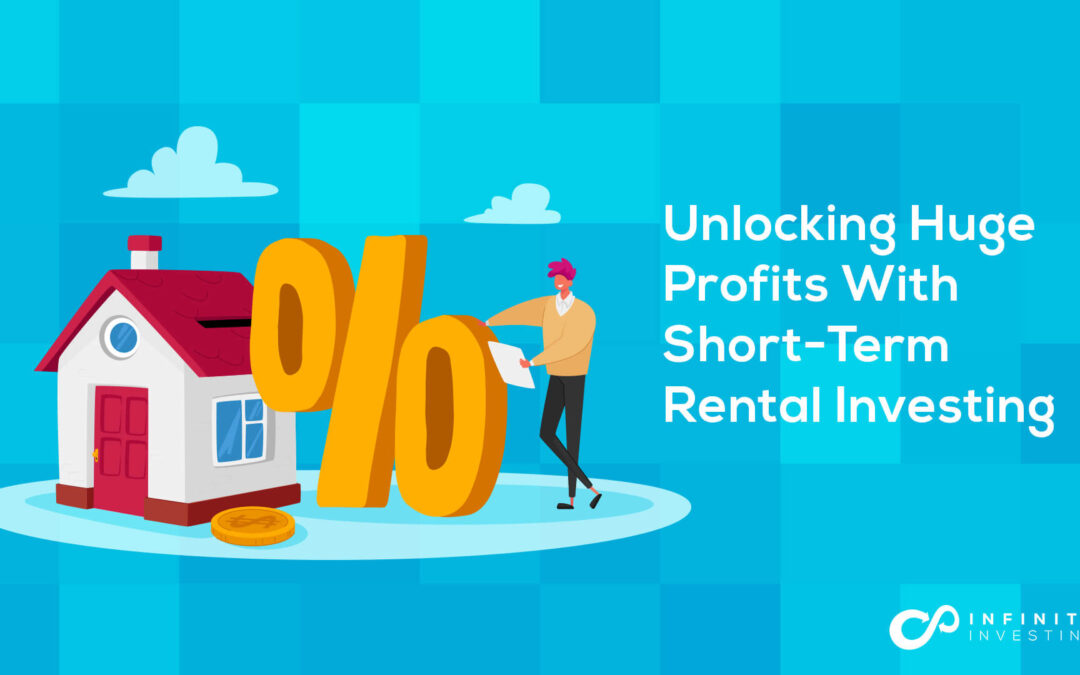
Short-term rental investing offers many benefits over traditional rentals, including higher rates and the opportunity to earn more profits. This article discusses the pros and cons of short-term rentals and provides tips and techniques to help you unlock huge profits. Learn how you can make your short-term rental investment plans a reality.
Key Takeaways
- Short-term rental investing is an investment strategy that involves buying a property to rent it out for less than 12 months.
- Vacation rentals offer many advantages, including higher returns, flexible schedules, and tax benefits.
- Choosing the right property in a highly desirable location and setting it at the right price is essential to successful short-term rental investing.
- Creating a business plan can help you compare the costs and earnings of a short-term rental to determine if it’s worth the investment.
- Outsourcing your short-term rental can turn it into a passive income opportunity.
Infinity Investing Featured Event
In this FREE event you’ll discover how the top 1% use little-known “compounders” to grow & protect their reserves. Our Infinity team of experts show you how to be the best possible steward of your finances and how to make your money and investments work for you instead of you working for them. Regardless of your financial situation today, you’ll have a road map to get to where you want to be.
What Is Short-Term Rental Investing?
A short-term rental investing strategy involves renting a property to short-term tenants. Short-term rentals are usually any rental period of fewer than 12 months. A short-term rental may be an Airbnb or vacation rental designed for vacationers or business travelers. Investing in short-term rentals can be an excellent way to generate steady real estate income and profits.
Pros of a Short-Term Rental Investing Over a Traditional Long-Term Rental
Short-term rentals offer many benefits over traditional long-term rentals, including:
- Higher returns: You can usually charge higher rates on short-term rentals, earning you more profits over the long term.
- Flexible tenants: Because you control your property schedule, you have more flexibility when guests visit. You can reserve times for necessary maintenance or a family vacation.
- Tax deductions: You can qualify for many of the same tax deductions with a short-term rental as you do with a long-term one.
- Appreciating asset: As long as you continue making your mortgage payments, you’ll build equity in your property. You can use this equity to fund additional investments.
- Upfront payment: Most rentals require guests to pay upfront to book the property. You can collect payments more frequently. It’s money you can use toward property improvements.
Considerations of a Short-Term Rental
Of course, it’s essential to be aware of the potential disadvantages of a short-term rental when deciding whether this strategy is right for you. A few considerations of short-term rentals include:
- Higher ongoing expenses: The expenses of a short-term rental may be higher than long-term rentals. With a short-term rental, you must account for cleaning, furniture, bedding, marketing, TVs, and dishes.
- More expensive upfront costs: The upfront costs of a short-term rental can be higher than a long-term rental property. In addition to renovation costs, you may have to furnish and decorate the property for comfort.
- More maintenance and management: With a constant rotation of tenants, short-term rentals often require a more hands-on approach. Some investors may choose to outsource short-term rental management to a property manager.
- Marketing needs: Marketing is essential to continue filling your short-term rental with tenants. You may need to set aside a budget for marketing unless you choose to use a booking portal like Airbnb.
- Unpredictable income: The income from a short-term rental can be less predictable than a long-term one. An increase in rental properties can lead to an uneven balance of supply and demand, which may require you to charge less.

Short-Term Rental Investing Tips to Earn Higher Yields
Review the following tips to earn higher yields and unlock huge profits with your short-term rental:
Choose the Right Property
Location is essential when investing in a short-term property. You want to choose a property in an area that’s in high demand. Your location may determine the type of guest you attract. For example, a condo overlooking the beach will likely be highly desirable to tourists planning a beach vacation. A smaller house near a large commercial complex may appeal to corporate employees visiting an area on business. In addition to the property, you’ll also want to check local ordinances before purchasing. Some cities have strict rules on short-term rentals that could affect your ability to earn a profit.
Review Existing Rentals
Reviewing the short-term rentals currently available in the area you’re interested in buying can help you predict profits. A thorough review includes checking nightly and weekly rentals of similar properties to get an idea of how much you can charge. It can also be helpful to look for any gaps in the market. For example, finding a multifamily home in a vacation area may allow you to extend your rental to families who vacation with their friends or relatives.
Create a Business Plan
A business plan helps you outline your short-term rental costs and income. Listing specifics, like the minimum you’ll need to charge to recoup costs and the going rate of similar rentals in the area, can help you determine if it’s a good investment.
A thorough business plan should also account for fluctuations in demand. For example, if you invest in a beach property, you can expect rental numbers to decrease during the winter months. You may charge less during the winter to attract renters or increase your rates during the peak season to account for the off-season period.
Learn From Guest Reviews
The more guests you can book in your rental, the more you’ll earn. Collect feedback from both positive and negative guest reviews to improve the guest experience. The more five-star reviews you can earn, the more likely others are to book your property. You can use less-than-perfect reviews to learn about the specific areas you can improve to earn more for your rental property.
Research Listing Portals
Many short-term rental owners advertise their properties on sites like Airbnb or VRBO. Research the costs of listing and renting through each site to ensure they fit with your business plan. These sites can charge a high fee for using their website and booking services but, in return, will usually bring you a steady flow of renters.
Create a Budget for Upkeep and Repairs
A short-term rental’s upkeep and repair costs may be higher than a long-term rental. Even though guests spend less time at your property, the increase in traffic can lead to faster wear and tear. With a short-term rental, you’re also responsible for maintaining furniture, appliances, and decor, which differs from long-term rentals. You’ll also be responsible for utility costs with a short-term rental, including electric, heat, water, and Wi-Fi. Make sure you account for these costs in your budget and nightly rate.
Plan for Taxes Throughout the Year
Short-term rental income is taxable. However, the Internal Revenue Service (IRS) allows you to deduct any expenses, which include maintenance, repairs, property management fees, furnishings, marketing, or even travel-related costs. Keep track of these expenses throughout the year to make tax filing easier. Accounting for all eligible tax deductions can help you keep more of the money you earn.
Invest in a Good Insurance Policy
A good insurance policy is a must when investing in a short-term rental. Without sufficient insurance, you could be personally liable if something happens during an individual’s stay. Additionally, an insurance policy protects you from unexpected events, like natural disasters, that could prevent you from renting out your property for an extended period.
Make sure you’re honest with the insurance company. Let the insurance company know you intend to rent the property as a short-term vacation. If you plan to allow guests to bring a dog, ensure your policy covers pets too. One of the perks of using Airbnb or other hosting sites is that many have built-in insurance policies.
Protect Your Assets Through a Business Entity
Structuring your short-term rental business through a limited liability company (LLC) can help shield your liability. Even though Airbnb doesn’t require renting through a business entity doesn’t mean you shouldn’t. An LLC might protect your finances if anything happens at your short-term rental.
Outsource Rental Management to a Professional
Some short-term investors may choose to outsource the management tasks of a short-term investment to a property management company. While this comes with a cost, the experience and resources available may be worth it. Vacation management companies usually have established teams that can ensure reliable cleaning and maintenance. A third-party management company can also deal with last-minute guest problems on your behalf, especially if you live in a different area or prefer a hands-off approach to guest services.
Investing in real estate, specifically short-term rentals, can help you generate wealth and meet your financial goals. Short-term real estate rentals can be a great fast, flexible income source. In addition to the ability to charge per night, you can earn equity in your short-term rental. You can then use this equity to build your real estate portfolio while increasing your profits.

Build Lasting Financial Freedom With an Infinity Investing 360 Pro Membership
Do you want to learn more tips and techniques for generating wealth through real estate? Sign up for our 360 Pro Membership, where you can access resources to unlock huge profits with short-term rental investing.
Infinity Investing Featured Event
In this FREE event you’ll discover how the top 1% use little-known “compounders” to grow & protect their reserves. Our Infinity team of experts show you how to be the best possible steward of your finances and how to make your money and investments work for you instead of you working for them. Regardless of your financial situation today, you’ll have a road map to get to where you want to be.

